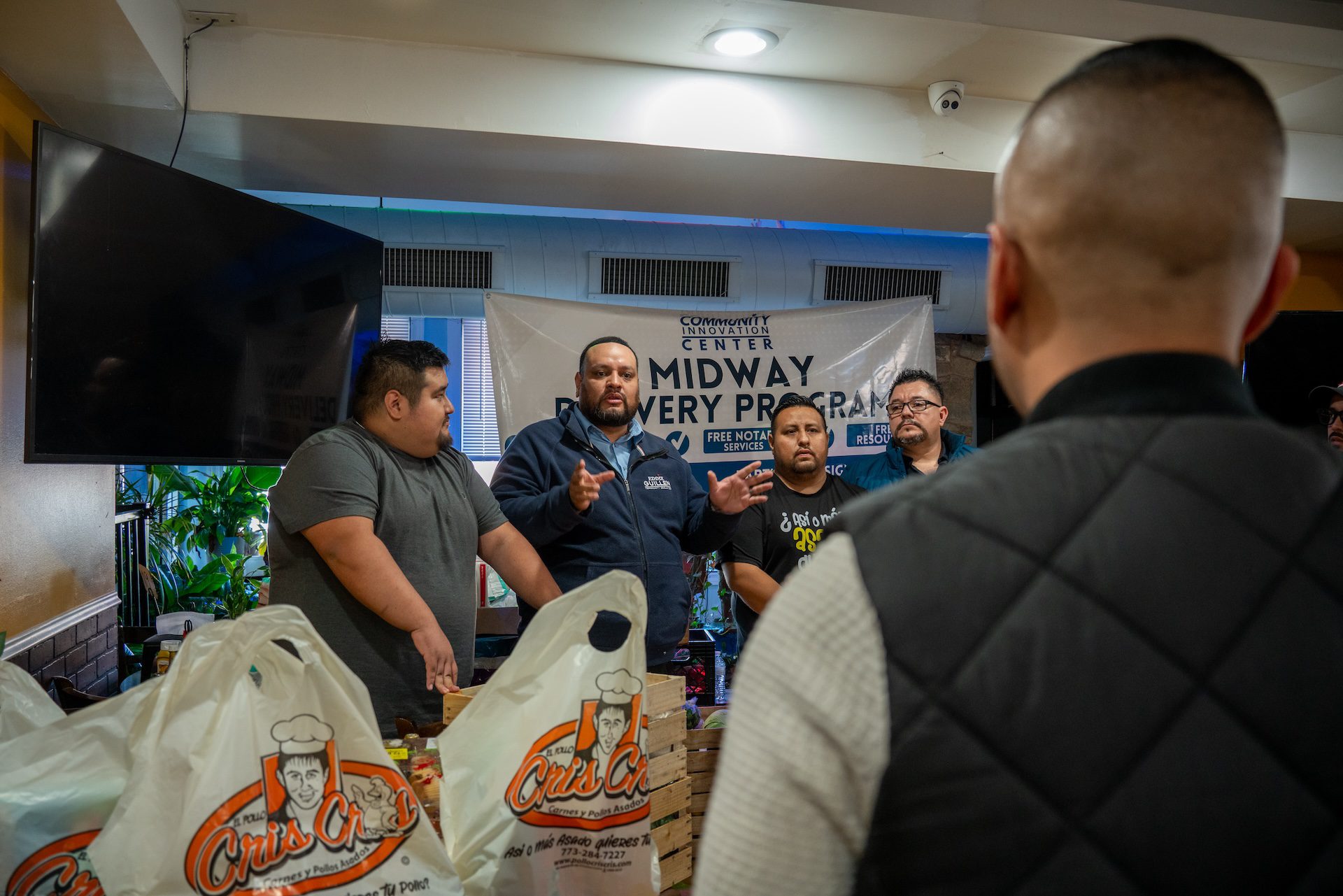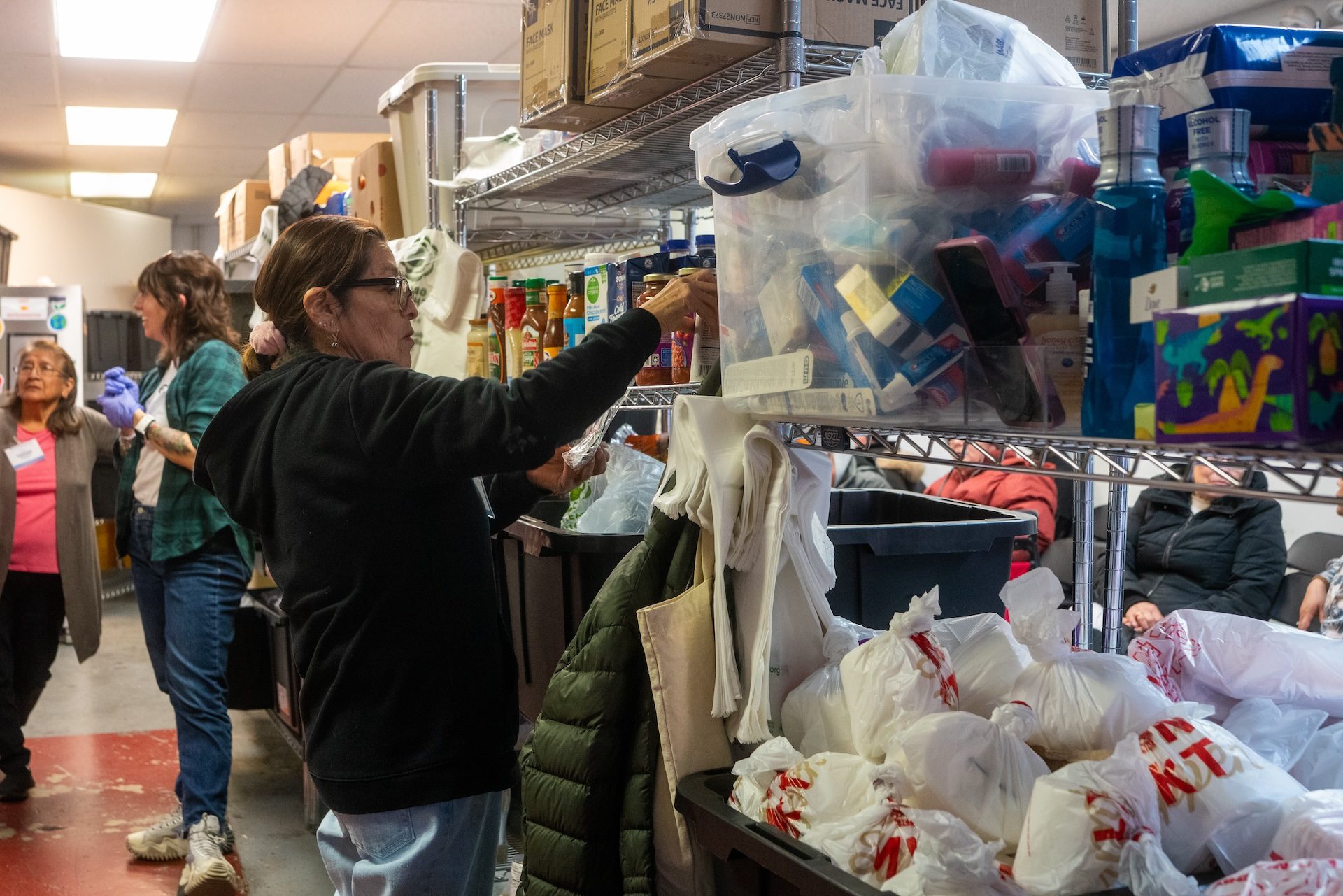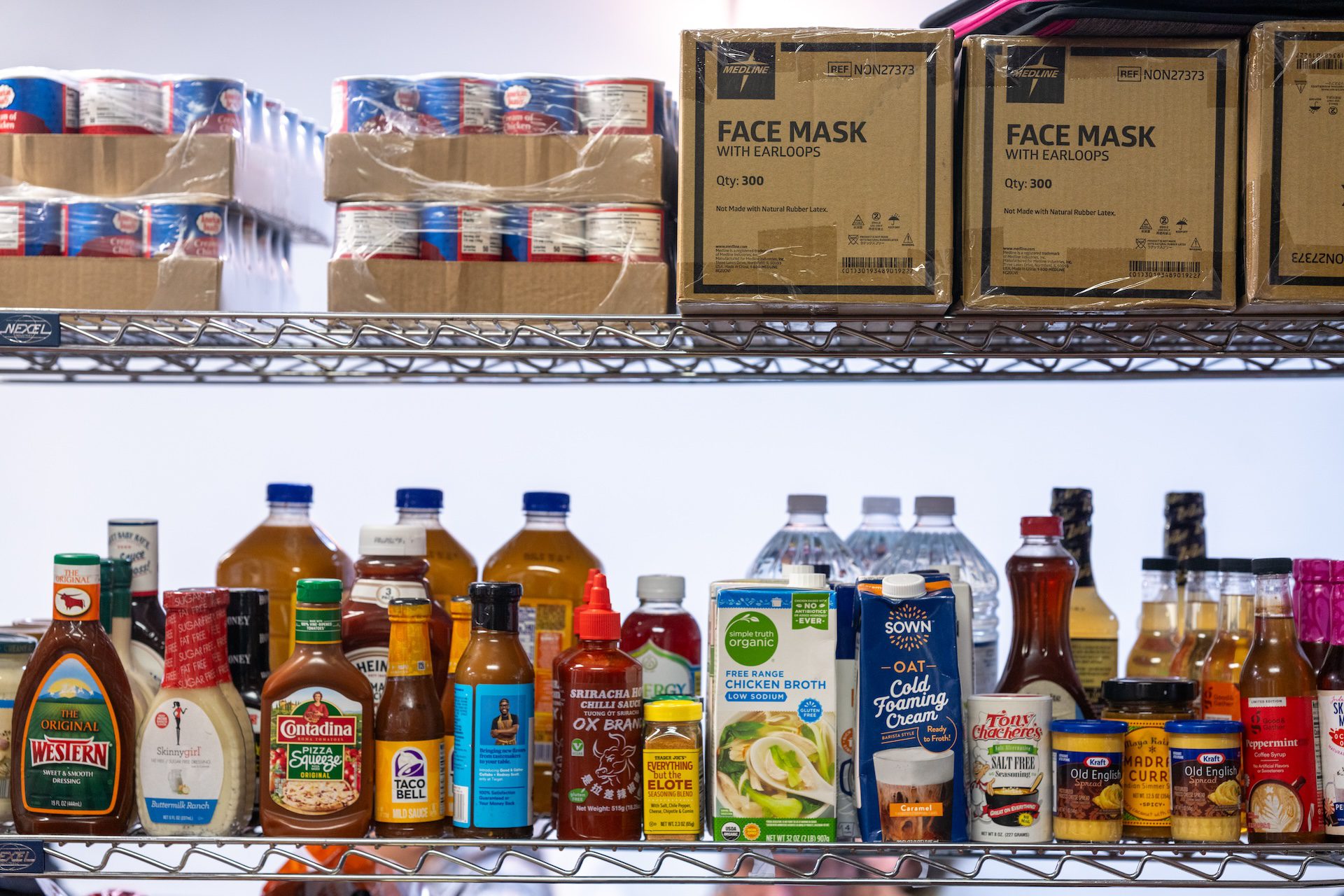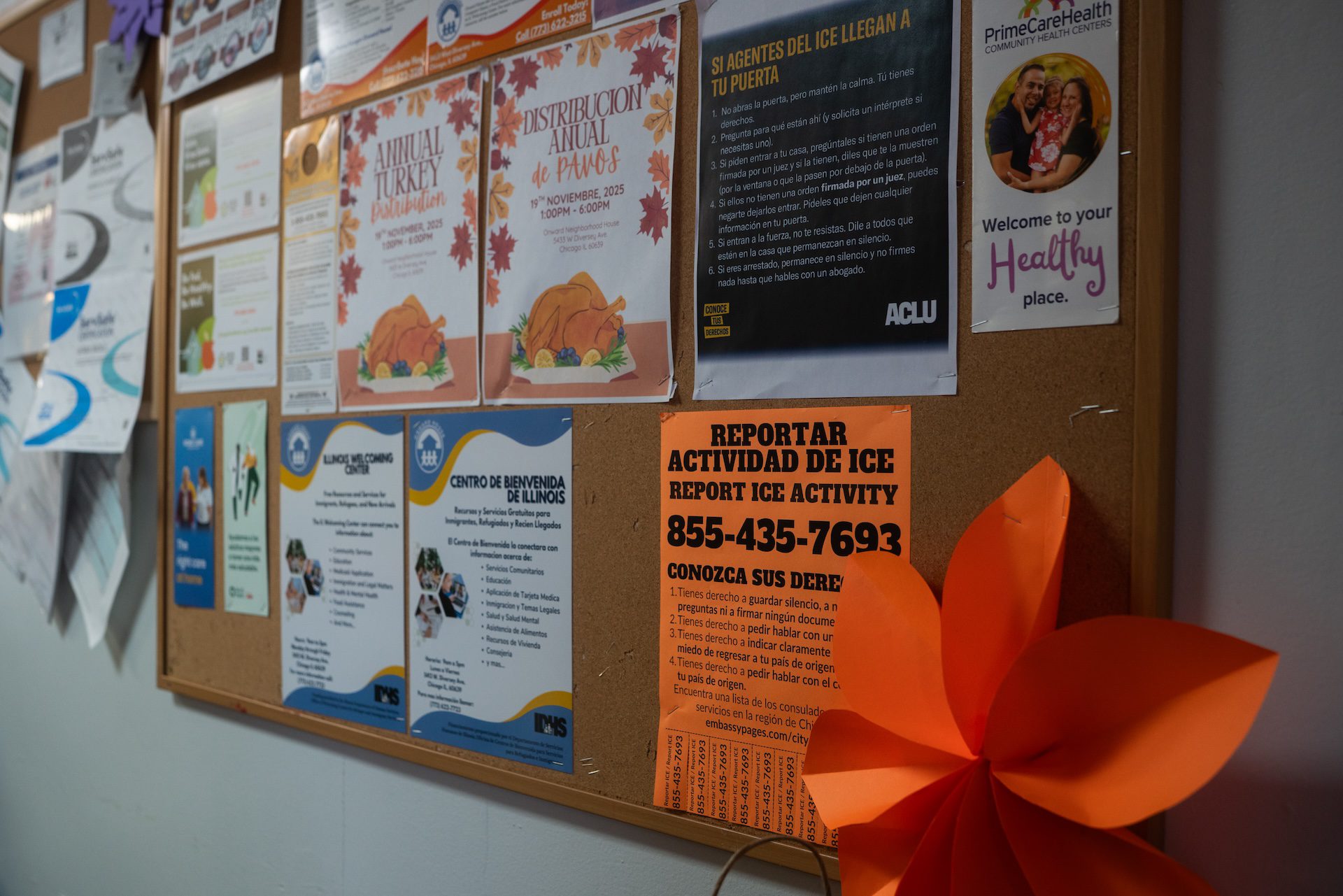 Camilla Forte/Borderless Magazine/Catchlight Local/Report for America
Camilla Forte/Borderless Magazine/Catchlight Local/Report for AmericaFederal benefit cuts and fear of ICE encounters are converging to push immigrant families already at higher risk of food insecurity into a deeper crisis.
Read Borderless Magazine’s free food resource guide for 2025. Click here to find the food pantry near you.
Corene Mendoza arrived 15 minutes before Onward Neighborhood House’s food pantry opened in Belmont Cragin. She wanted to get there early.
The first time she visited the pantry a few weeks prior, many of the items she hoped to bring home had run out.
News that puts power under the spotlight and communities at the center.
Sign up for our free newsletter and get updates twice a week.
On a recent visit, she hopes to have better luck finding flour, milk, chicken and potatoes — the ingredients she needs to make her daughter’s favorite meals: homemade chicken nuggets and waffles.
“I don’t really do it for me,” Mendoza said. “I do it for my daughter, because she’s got to eat.”
Since losing her Supplemental Nutritional Assistance Program (SNAP) benefits in August due to her income level, Mendoza has had to stretch her dollar at a time when inflation has kept grocery prices high. That means she relies on support from Onward House’s food pantry to make ends meet.
Mendoza is one of many people in Illinois who have slipped deeper into food insecurity amid SNAP cuts or eligibility changes. These cuts and changes also come as heightened immigration enforcement has created additional barriers and fears among low-income immigrant families facing food insecurity in Illinois.
A few weeks after the shutdown ended, many are still recovering from SNAP benefit cuts that occurred during the record-long shutdown. Meanwhile, an estimated 250,000 refugees and other humanitarian visa holders could soon lose food stamp benefits permanently as new eligibility requirements take effect next month.
Community organizations, such as the Greater Chicago Food Depository, which supports a network of 800 pantries, say this has created a ripple effect that will persist as non-profit organizations and food pantries work to fill the gaps.
“Even with the government reopening, we are preparing for an ongoing hunger crisis,” said the Greater Chicago Food Depository (GCFD) in a statement.
A deep cut
During the 43-day government shutdown, Donald Trump’s administration froze funding for SNAP and partially cut food assistance for nearly 2 million people in Illinois.
During the shutdown, pantries stepped up to fill the gaps that families temporarily experienced while food stamps were withheld, which led to an increasing demand for free groceries. GCFD said that it served 38% more households in the first week of November compared with the first week of October.
“In this process, we’ve learned how vitally important SNAP is,” said Camerin Mattson, manager of communications at the GCFD. “It is our nation’s frontline defense against hunger, and so many people rely on that.”
Mayor Brandon Johnson signed an executive order on Nov. 15 directing the city to respond to changes in SNAP benefits eligibility and funding cuts. The executive order directs more city resources to local community organizations, non-profits, food pantries and places of worship to supplement food access programs.
Read More of Our Coverage
The new order says city departments will also monitor independent retailers and restaurants affected by SNAP cuts, decreased foot traffic due to immigration enforcement and increased need for free and donated food products. The departments will be required to prepare weekly status reports identifying urgent needs and communities most impacted by SNAP cuts.
“We cannot accept Chicagoans going hungry as a result of the Trump administration’s war on poor and working people,” he said. “While there has been a great deal of attention on the gap in SNAP funding because of the shutdown, we also face a longer-term, more consequential crisis with the cuts to SNAP as part of Trump’s [One Big Beautiful Bill].”
Although the shutdown ended on Nov. 12, immigrants will continue to be impacted by changes to SNAP. Stricter requirements take effect on Dec. 1, and refugees and certain other lawful immigrants will no longer be eligible for SNAP benefits.
“Trump’s budget bill is designed to deliberately prevent Americans and Illinoisans from receiving assistance through the SNAP program by implementing new requirements that burden states and individuals who rely on this 100 percent federally funded benefits resource,” said the Illinois Department of Human Services (IDHS) in a written statement.
Over 340,000 people in Illinois are at risk of losing food benefits if they cannot demonstrate that they meet work requirements or qualify for an exemption, and approximately 146,000 legally present immigrants in Illinois are at risk of losing their SNAP benefits due to eligibility changes, according to IDHS.
Sally Schulze, communications manager at RefugeeOne, said the organization is preparing for the impacts of these new changes by ramping up its efforts to connect families in need with local food resources, working to collect more donations and tapping into emergency funds.
“This can’t replace the full support of a government program,” she said. “Without SNAP during that time, they wonder how they’ll feed their children.”
Hundreds of RefugeeOne clients are already struggling to afford groceries, many with large families and some who haven’t obtained jobs, have been laid off, or have health conditions.
“These are refugees who’ve fled war, conflict and persecution, then were welcomed to resettle in the United States,” Schulze said. “They never expected a crucial segment of their safety net to unravel as they try to rebuild their lives.”
Local groups try to meet growing demand
In recent months, pantries and community groups have attempted to bolster their efforts in the face of ongoing food access issues for immigrants. They’ve been collecting more donations and increasing the number of volunteers to support the growing demand. Those efforts are not expected to slow even as the government shutdown has ended.
On Chicago’s Lower West Side, the number of new clients served at Pilsen Food Pantry has increased 50% in the past three weeks. The demand has prompted the pantry to allocate more resources to fresh produce to meet the higher demand, according to Pilsen Food Pantry Director Evelyn Figueroa.
About 10 miles away, Onward House in Belmont Cragin has also seen a surge in people visiting the Food Pantry on Chicago’s Northwest Side.


Emilio Araujo, director of development and communications at Onward House, estimated the pantry saw an increase from 300 to 500 people in early November.
“There were new faces in the last week, a lot of new faces that came to the pantry,” Araujo said. “People who might not typically have to rely on the food pantry.”
One of those new faces is Mendoza, who plans to continue visiting the Onward House pantry twice a month — the maximum number of visits allowed.
“It has been very challenging in already challenging work that we do,” said Araujo. “We have participants fearful of leaving their homes.”
Both pantries also partially attribute the increase in demand to families fearing ICE encounters.
As immigration enforcement intensifies and uncertainty looms for immigrant families, a loss of SNAP funding has created new challenges for them and the communities they serve. Since the start of the Trump administration’s “Operation Midway Blitz,” Immigration and Customs Enforcement (ICE) has targeted construction workers, street vendors and daycare teachers.
“Since the inauguration, the tone in our community has been very different,” Araujo said. “I think the mounting fear, and particularly as ICE action has been really ramped up, has significantly impacted families here.”
To keep up with demand, Onward House has added a second distribution day, expanded hours and created a waiting area inside to reduce the time people wait in line outside for food. They recently launched a pilot grocery delivery program for individuals who don’t feel safe visiting the food pantry. They currently serve 50 families through the program.
Meanwhile, Onward House has been partnering with the Northwest Side Rapid Response Group to assist in monitoring ICE in the area.

The Pilsen Food Pantry has responded to community fears stemming from the presence of ICE, implementing emergency drills, patrolling outside and increasing deliveries.
Lingering fears
Pantries are not alone in responding to the intersection of food security and ICE fears that immigrants are facing.
More than 25 local businesses across the city have partnered to collect and deliver food to the doorsteps of families who are afraid to leave their homes for groceries due to ICE enforcement, according to Eddie Guillen, the executive director of the Community Innovation Center – a nonprofit organization centered on food security, wellness and civic engagement.
As part of the initiative, more than 100 volunteers have been vetted to ensure safety and privacy are maintained in the grassroots grocery delivery service, he added.
“We’re talking about families that could be undocumented, and there is a reason why they need [groceries] to be delivered,” Guillen said. “We have to vet volunteers and the public because we don’t want just anybody to have access to addresses and information.”
Nubia Tapia, a mother and healthcare worker, has found time to volunteer for three months, delivering groceries to families in need.
“Food should be a right,” she said. “It should not be a privilege. Every person should have something to eat.”
In addition to being a grocery delivery service, the operation also involves distributing informational resources throughout the community.
Tapia says families have been grateful for her services in a moment when they need it most.
“In a time like this, when this administration is filled with hate, it is important for us to care for one another, to remind each other that we are all human.”
Clarification 12/11/25: This story has been updated to clarify RefugeeOne clients’ ability to work legally in the U.S.
Aydali Campa is a Report for America corps member and covers environmental justice and immigrant communities for Borderless Magazine. Email Aydali at [email protected].
Tara Mobasher is Borderless Magazine’s newsletter writer and reporter. Email Tara at [email protected].
Katrina Pham contributed to this report.


